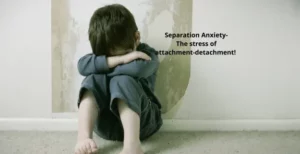One of the most popular strategies applied by parents to encourage discipline in children is ‘Distraction’. Distracting children is a preferred strategy to avoid worsening the tantrum, controlling difficult behaviors, and reducing situational stress. It is a method of quickly distracting children and replacing their attention and energy with some other stimuli, resulting in parents achieving their goals. Experts argue that distraction is a bad idea, although it works successfully.
Let us dig deeper!!
Why does distraction work?
Distraction is a popular strategy and works 90 percent of the time because:
1. Its appeal is understandable because it is just a replacement for something undesirable for something attractive. It’s a strategy where parents just hit the nail perfectly with a Phew!!
2. It is an escape technique, where one doesn’t have to deal with drama. There is no confrontation, there are no explanations, so reasonings and no negotiations.
3. It helps to dodge the bullet of a child’s tantrums and difficult behaviors such as crying spells, fear, anger, or meltdowns (and it’s embarrassing to deal with all this in public!)
These all may make Distraction a go-to strategy. But it isn’t recommended, here are the 5 reasons why!
Why is a distraction a bad idea??
1. A child misses learning at that moment!
If a child is distracted for an unacceptable behavior or for an emotion that is felt at that time in an environment, it is an indicator that the parent doesn’t want to deal with it at that moment. Although it may be a personal parenting choice, Distraction denies them the chance to learn from what happened, learning at that moment which could be powerful such as taking turns, self-control, and not always getting what they want. We save them from disappointment, but they end up missing out on several life skills.
2. It doesn’t address and acknowledge the child’s motives, purposes, and intentions!
Children behave the way they behave for two reasons- Either to avoid something or to gain something. With the distraction, the impulses that occur at that moment are completely ignored and remain unaddressed without any investigation of the root cause. For example, the reasons for being upset are not addressed, the reasons for a sudden outburst are not accepted or the feeling of fear or anger remains unvalidated. With this, the parents are communicating that these feelings aren’t important.
3. It isn’t a respectful gesture. With the distraction, children are dodged. The feelings and emotions experienced by children during a meltdown are overwhelming. They are precious and hard for them as they are yet to build tools to deal with them. Parents need to be with children during the bad, the good, and the ugly days.
4. It underestimates and discourages attention, awareness, and capacities.
Distraction overshadows their capacities. The capacities to learn, to explore, to learn from mistakes. A child may lose a learning moment due to irrelevant distractions. They would eventually learn to ignore their state of mind, the strong emotions hampering their attention and awareness.
5. It misses guidance.
Parents also miss the opportunities to build connections with children and guide them through the hard times. Also, rarely parents could go back and address that topic again once distracted. They could miss out on teaching survival tools and techniques.
A part of mindful parenting is redirecting children rather than distracting them. Demonstrating calmness, following relaxation techniques, pausing before responding, addressing the issue rather than avoiding it, using words, and trying not to shy away from embarrassment but instead address them bravely for the betterment of children by using examples and simple explanations could help children pass through the storm!






